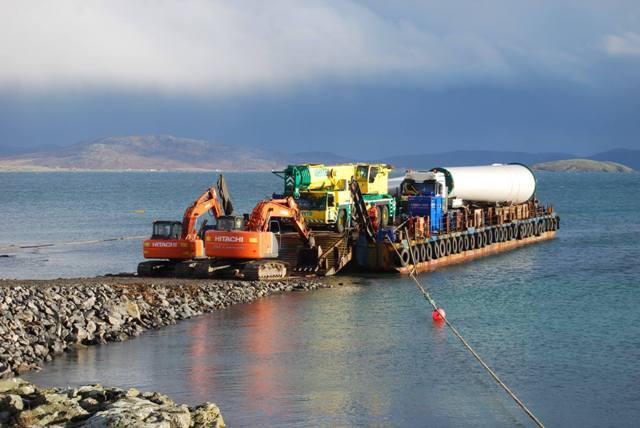
Residents on the Hebridean islands of Barra and Vatersay are now the proud owners of a 100% community-owned 900kW wind turbine.
Located in Eoligarry in the north-west tip of Barra, the £2.45 million wind project has taken eight years to get up and running.
Coimhearsnachd Bharraidh agus Bhatarsaidh (Barra and Vatersay Community) Ltd is a community-owned company whose aim is to support community development on Barra and Vatersay.
The community body originally set the ball rolling for the project back in 2005 when a feasibility study was carried out into the prospects for wind generation on Barra and Vatersay.
Six potential sites were identified, but following community consultation the Gòb Sgùrabhal site was chosen and 900kW grid connection was agreed with SSE in January 2007.
Planning and scoping – including an environmental impact assessment – for the project began not long after and full planning permission was granted in November 2009.
Wind turbine developer Enercon was then chosen as the turbine supplier and the community body hired an accountant to develop a finance model for the project.
The structure of the community company changed to charity status and a wholly-owned subsidiary – Barra and Vatersay Wind Energy – was formed in 2011 to take control of the project.
The project was financed with a £1.85 million loan from Triodos Bank; a £300,000 loan from the Renewable Energy Investment Fund, which is administered by Scottish Enterprise, and £120,000 from the Scottish Government’s Community and Renewable Energy Loan Scheme (CARES).
Road surveys were carried out in June 2011 and November 2012, and a plan was devised to transport the turbines and cranes to the site via a barge from the main town of Castlebay in Barra.
The turbine is now up and running and will soon be generating income for the community trust following full Feed-in Tariff accreditation with Ofgem.
Euan Scott from Barra & Vatersay Wind Wind likened the plan and build of the scheme to a hurdle race.
“I often think of it as being a project that shouldn’t have happened but it did – we are lucky,” he told Energy Voice.
Recommended for you
